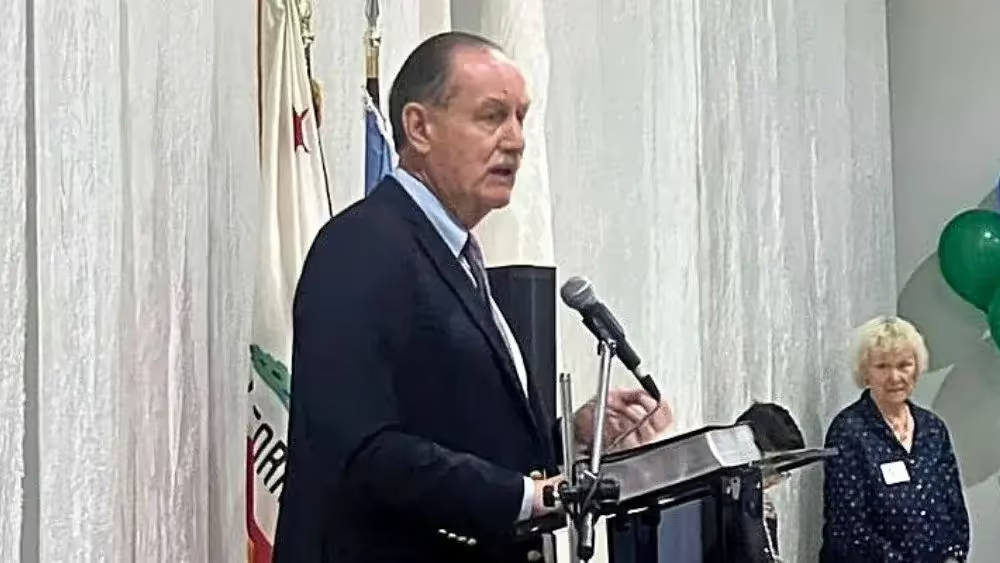It was in a school hallway that high school junior Rick Cole heard the words that would change his life’s trajectory. He had just given his first public comment to his local board of education, opposing their plan to close the school rather than face integration. “You’re an impudent young punk who doesn’t know what he’s talking about,” was the response.
Cole fled in humiliation, but not before being caught by the assistant superintendent whose plan he was criticizing. He poked Cole in the chest. “You are the reason we have schools,” he said, to Cole’s surprise. “The whole purpose of education is to get kids to think.” He told Rick to keep coming back, to keep giving comments until they listened to him with respect. Cole took that advice seriously, becoming a vocal supporter of integration at protests and school board elections.
Cole describes that experience as a “Robert Frost, ‘two paths diverged,’” moment that defined the rest of his life. Down path one was a version of himself who considered city hall “too big” to fight, as nothing more than a group of people who wouldn’t listen. Down the second path was the version of himself that has been engaged in local government in one form or another since 1983, that sees such participation as a way to stand up for the most vulnerable and have a positive effect on people’s lives.
Bringing Smart Budget Reform to Los Angeles
After nearly four decades of holding both elected offices and staff roles in public service, Cole is now serving as the deputy city controller for the city of Los Angeles, leading an urgent effort alongside his boss, Controller Kenneth Mejia, to reform how city leadership allocates, spends and accounts for billions of public dollars each year. You could say it’s the same thing he was challenged to do in that hallway: “Keep showing up until they listen to you.”
According to a recent report from Mejia’s office, the city is facing a $1 billion budget shortfall rooted in erroneously large revenue projections, a systemic misunderstanding of certain budget items (like liability payouts), high infrastructure costs due to years of deferred maintenance, and increased union payouts.
Mejia and Cole have been warning about these vulnerabilities for two years. At first, they were dismissed as “relying on theatrical exaggerations and doomsday projections.” But just this month, it seems LA’s council has started to face the reality of the situation, adopting a budget that closed the gap by laying off 600 employees, closing 1,000 employment vacancies and plugging what was left with reserve funds.

Although far from a perfect solution, Cole sees it as a sign that city leadership is finally starting to face the severity of the situation and step up to the challenge of long-term budget reform. To that end, he and Mejia are continuing to call for several reforms that could help the city move in a more financially sustainable and accountable direction:
- Move to a two-year budgeting cycle rather than the city’s current one-year process.
- Install a qualified chief financial officer for the first time in city history.
- Bring electeds, management, labor and the community together to strategically restructure city government to live within its means.
- Adopt a realistic five-year capital plan.
A Better Way for Cities To Approach Public Spending
Cole never saw himself as a “numbers guy” and admits municipal finance is an acquired skill, refined over the years since being sent to his first municipal bootcamp in 1983. The importance of fiscal responsibility would become clear to him once he became the city manager of Azusa, California, in 1998. Coming into the role as the seventh manager in 15 years and shortly after the public turned down four tax proposals (a fifth died in litigation), he realized that Azusa (and cities in generally) urgently needed to change how they understood the relationship between the public, local government, and the tax dollars they are entrusted to spend.
First, Cole says cities must take the threat of obsoletion seriously. Public willingness to pay is limited, and leaders must build public trust by showing the results coming out of public spending. Pointing to private sector examples like the decline of Blockbuster, Netflix, travel agents and even newspapers, Cole warns against the idea that local government is somehow immune to similar decline. “Government has this delusion…that the stuff we provide is always going to be wanted and always going to be needed,” he said. “It’s not.”
He says cities can prevent such obsoletion by embracing a results-oriented approach to budgeting and spending. This looks different for every city, but Cole emphasized four core practices. First, leaders must define success by setting priority outcomes. This requires they understand the difference between an output and an outcome. An outcome is a more holistic, qualitative way of defining success. For example, let’s say a city increases its police spending. A corresponding increase in 911 calls would be an output of that spending. An overall reduction in crime would be an outcome.
Second, leaders must develop and track metrics to assess progress. In other words, they need to create systems to know if their investments are actually working. Third, city leaders should spend more on what works and less on what doesn’t. This simple guideline means focusing less on doing what’s always been done or on following top-down “best practices,” and instead spending money on things that achieve the desired outcomes. Lastly, Cole urges cities to continuously monitor and assess their process and outcomes, to embrace a mindset of continuous improvement.

“The way we’ve always done things doesn’t have to be the way we continue to do them,” Cole said. He pointed to fire trucks as an example. According to the U.S. Fire Administration, only 4% of calls to the fire department are actually for fires, thanks to improvements in building materials and inspection processes. Yet cities keep spending millions on trucks, training and equipment because…that’s what’s always been done. Cities can avoid this by embracing what Cole calls a dual approach of continuous improvement: First, continually seek to improve your services. Secondly, be willing to constantly question whether or not the existing service model is the best, most efficient and most cost-effective way to deliver an outcome.
The Financial Reality Cities Must Now Face
As more and more cities face rocky financial futures, leaders are going to have to have difficult conversations with their staff and constituents about money: what’s available, what’s not and the tough decisions that must be made to stay afloat. Cole says the future of municipal finance depends on leaders’ ability to demonstrate to the public the connection between dollars spent and outcomes achieved. “If we're not demonstrating that we're producing results in tangible measurable ways, we are just not going to be able to survive.”
On a day to day basis, Cole is surrounded by numbers and discussions about money, but for him, it’s not really about money. Budgets, he says, “are the embodiment of a community’s values.” Just as he did back in high school, he sees his work as standing up for those on the edges of society. “When a budget is on autopilot (essentially an extension of business as usual) there is no accountability to whether the spending is actually producing the results that matter most,” he shared over email. “Including serving and protecting the most vulnerable.”

